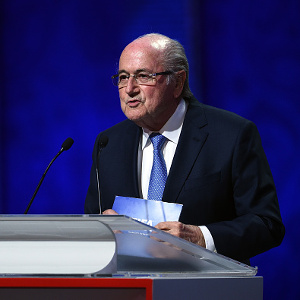Apartments in the Alps are among assets seized in a probe into alleged corruption at Fifa, Switzerland’s attorney general said on Monday, warning that the inquiry had not yet reached “halftime”.
Switzerland began its investigation into the bidding process for the 2018 and 2022 World Cups in May, when the US justice department unsealed charges against 14 people accused of massive graft over decades within world football.
Swiss Attorney General Michael Lauber, speaking alongside his US counterpart Loretta Lynch, said his wide-ranging investigation was nowhere near complete.
“Financial assets have been seized, including real estate… in the Swiss Alps,” Lauber told reporters in Zurich, adding that investigators had also searched homes, confiscated masses of electronic data and scrutinised 121 bank accounts.
“Clearly, we are not even near the halftime break,” he said.
Swiss authorities have not yet named any individuals who could ultimately be subject to criminal charges.
Fifa’s ethics chief Dominic Scala said in June that it was possible that Russia and Qatar – awarded the 2018 and 2022 World Cups respectively – could be stripped of their hosting rights if there was clear evidence that bribes were paid in the bidding process.
More US charges expected
The US case – which is separate from the Swiss investigation – has so far led to charges against nine ex-Fifa officials and five sports marketing executives.
When she announced the indictment in May, Lynch said she expected the case to widen and on Monday made clear that more charges were expected.
“We anticipate pursuing additional charges against individuals and entities,” Lynch said. “We are following the evidence where it leads.”
She however declined to discuss whether any charges were imminent against Fifa’s embattled president, Sepp Blatter.
The 79-year-old Blatter has announced that he will step down when his successor is chosen at a special election in February, but he has fiercely denied any wrongdoing, blaming all impropriety under his watch on “rogue” individuals.
Lynch has said her office has uncovered evidence of corruption at world football dating back to 1991, including bribes and kickbacks worth more than $150 million, as well as widespread money laundering.
Key to the US case has been the cooperation of Chuck Blazer, the former head of the Concacaf region responsible for football governance in north and central America and the Caribbean.
Blazer has cooperated with Lynch’s investigation after admitting to receiving bribes from Morocco and South Africa in connection with bidding for the 1998 and 2010 World Cups.
Of the seven people arrested in Zurich in May in connection with the US indictment, only one, ex-Fifa vice president Jeffrey Webb of the Cayman Islands, has been extradited to face trial in American courts.
Swiss officials have said they are likely to rule on the remaining six extradition requests this month.
Lynch said she was “hopeful” that all would be sent to the US and thanked the Swiss government for its “assistance” through the extradition process.
She said her investigation, which has relied on cooperation from multiple countries, aims to permanently eliminate the culture of graft that has plagued the world’s most popular sport.
“To anyone who seeks to live in the past and to return soccer to the days of corruption and bribery, cronyism and patronage, this global response sends a clear message: you are on the wrong side of progress,” Lynch told reporters.
Ex- CAF Media Expert. An expert on African football with over 15 years experience ,always with an ear to the ground with indepth knowledge of the game. I have worked for top publications including 7 years at www.supersport.com until i founded www.soka25east.com to quench the thirst of football lovers across the continent. I have trained young upcoming journalists who are now a voice in African football.I have covered World Cup,AFCON,CHAN,Champions League,Confederations Cup,Cecafa,Cosafa,Wafu and many other football tournaments across the World. Founder Football Africa Arena(FAA),Founder www.afrisportdigital.com



CAF Confederation Cup
Simba book final spot in CAF Confederation cup
Must See
-


AFRICA
/ 5 years agoSierra Leone FA President Isha Johansen endorses Patrice Motsepe for CAF President
Sierra Leone FA President who also doubles up as CAF Executive Council member Madam...
-


Football
/ 5 years agoIT JUST CAN NOT BE – AN AFRICA FULL OF MORONS?
By John De Mathews, There is an eerie silence around Africa, and it is...














